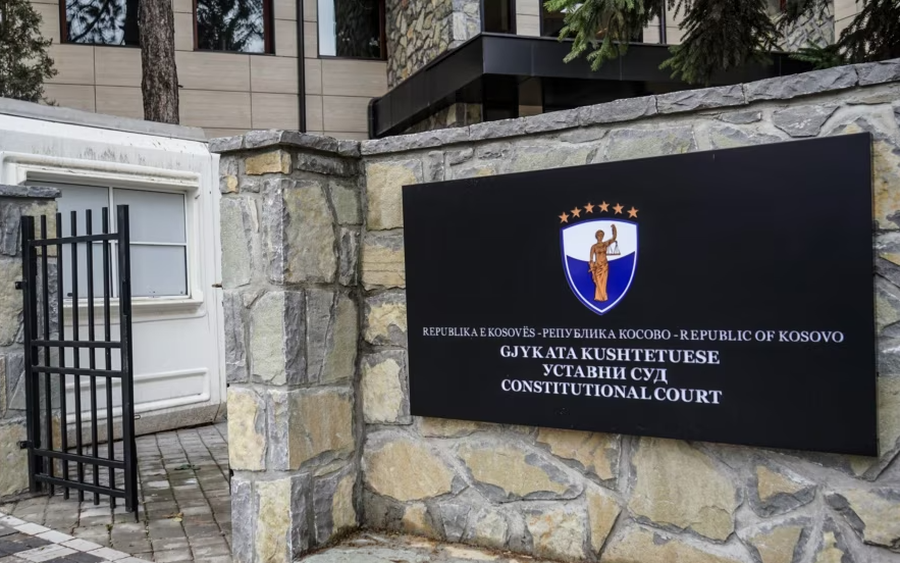
Experts on legal and constitutional issues in Kosovo have different opinions on the action of the Vetëvendosje Movement to address the Constitutional Court against the Supreme Court's decision regarding postal votes.
This party announced on March 27 that it had asked the Constitutional Court to assess the constitutionality of the Supreme Court's decision, which, a day earlier, dismissed its appeal against a decision by the Electoral Complaints and Appeals Panel (ECAP), which also dismissed the party's appeal on postal voting.
What does Vetevendosje's request for the Constitution mean?
The former Deputy President of the Constitutional Court of Kosovo, Kadri Kryeziu, says that no political party in Kosovo - including the Vetëvendosje Movement - is a party authorized by law to file a request with the Constitutional Court.
"There is no possibility that as a group, as a party, it can make any request for the review of any decision [by the Constitutional Court]," he tells Radio Free Europe.
According to him, the Vetëvendosje Movement only wants to buy time, because, "in the legal-constitutional aspect, its action is zero."
The Law on the Constitutional Court specifies that a request to this court may be submitted by one quarter of the members of the Assembly of the Republic of Kosovo, the President of the Republic of Kosovo, the Government or the Ombudsman.
But Ehat Miftaraj, executive director of the Kosovo Law Institute, says that the Vetëvendosje Movement has used the preliminary legal remedies established by law - such as complaints to the ECAP and the Supreme Court of Kosovo - and this paves the way for a complaint to the Constitutional Court.
“They have the right to complain [to the Constitutional Court],” says Miftaraj.
He also believes that the Vetëvendosje Movement is trying to gain time, in an attempt to reach the necessary votes in the Assembly to form the new government.
In the parliamentary elections on February 9, no party won enough votes to govern alone, not even Vetëvendosje, which won around 42 percent.
"First of all, it should be understood that the Constitutional Court has dealt with similar cases in the past, no more than in 2021, when a party from the non-majority community filed an appeal. But, despite this, the Vetëvendosje Movement, that year, did not at all wait for the Constitutional Court's decision and began the formation of institutions, the constitution of the Assembly, the election of the Speaker, Deputy Speakers of the Assembly, as well as the formation of the government," says Miftaraj.
Could the request of the Vetëvendosje Movement affect the finalization of the electoral process?
The Central Election Commission certified the results of the February 9 parliamentary elections on March 27.
Both legal and constitutional experts say that waiting for a decision from the Constitutional Court, which could take many months, cannot be an obstacle to the creation of new institutions.
But what impact can a "temporary measure" have on a given decision?
The Vetëvendosje Movement also requested that the Constitutional Court impose an "interim measure" against the Supreme Court's decision.
"In this specific case, [the Constitutional Court] does not issue any verdict, because it does not have the right to handle requests from unauthorized parties," says Kryeziu.
Miftaraj disagrees, saying that the Constitutional Court can address this request from the Vetëvendosje Movement.
"If the Constitutional Court decides on 'interim measures', then, until the [final] decision of the Court, neither the Assembly of Kosovo can be constituted nor the new government formed," says Miftaraj.
But, according to him, past practices have shown that the Constitutional Court does not impose "temporary measures" in cases and circumstances similar to the current one.
He expects the Constitutional Court to weigh the importance of the democratic functioning of institutions on the one hand and the potential negative outcome from their dysfunction on the other.
"The Constitutional Court takes six months or a year to make a decision. Can the country imagine a year without an Assembly?", concludes Miftaraj./ REL (A2 Televizion)











